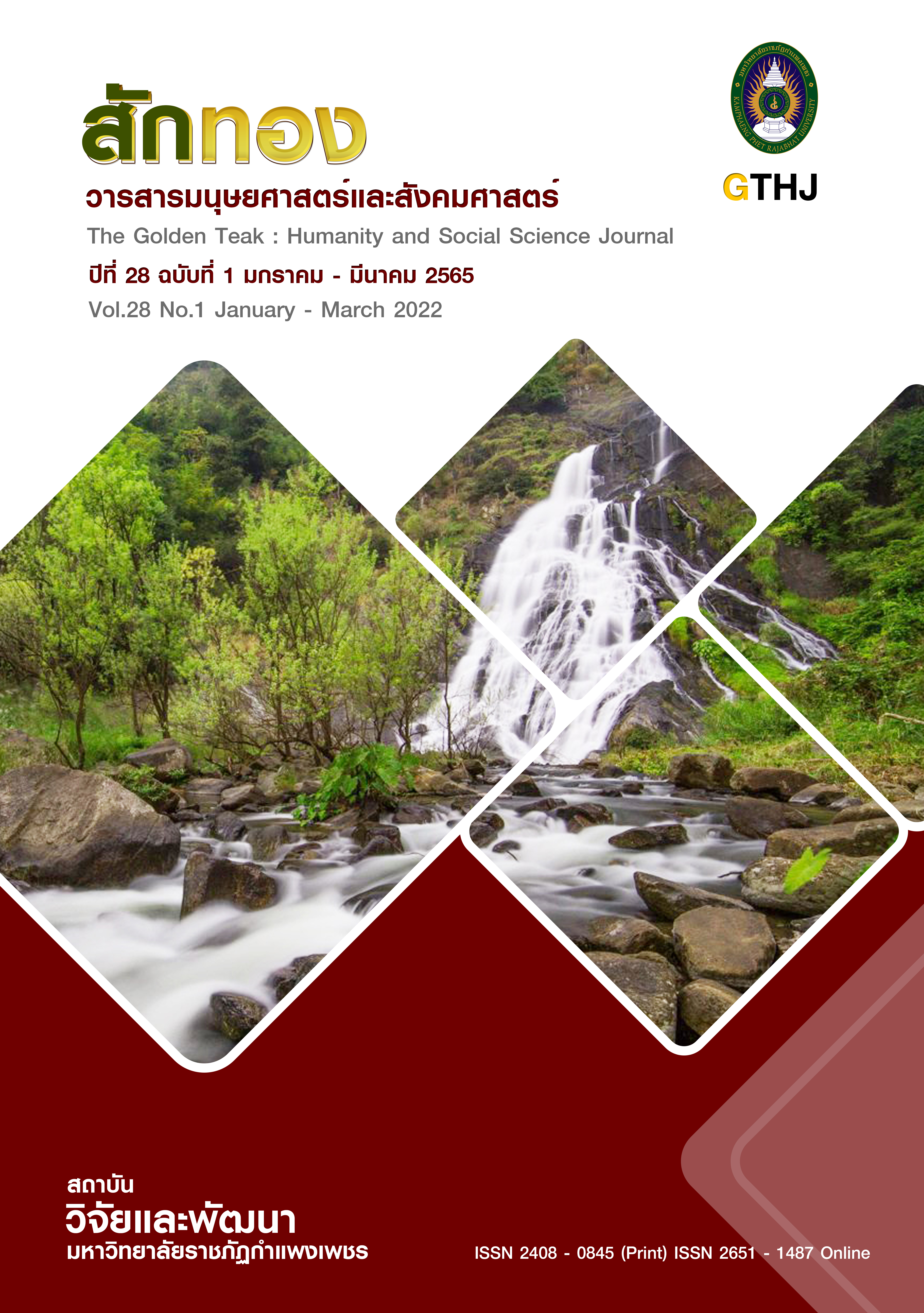Dull, Poor, Pain : Collective social identity from ASEAN short stories
Main Article Content
Abstract
This article aimed at studying the collective social identities from ASEAN short stories about economic and livelihood. This article was a part of dissertation entitled “ASEAN Collective Identity in short stories of ASEAN writers” studied 100 titles of ASEAN short stories with concept framework of Identity and Collective Identities. The result found that 33 titles of ASEAN short stories showed the collective identities of economy and livelihood that most of ASEAN people were poor. The writers presented via characters who were poor, lack of asset, money, and four requisites. The poverty made ASEAN people have a low quality of life and it affected their opportunities in 5 dimensions that was 1) education 2) medical care 3) public service access 4) power exercise and 5) equality. In addition, the poverty of ASEAN people was a low socio-economic status (poor) affecting education (dull) and health (pain) endlessly.
Article Details

This work is licensed under a Creative Commons Attribution-NonCommercial-NoDerivatives 4.0 International License.
บทความที่ได้รับการตีพิมพ์เป็นลิขสิทธิ์ของวารสาร สักทอง : วารสารมนุษยศาสตร์และสังคมศาสตร์ สถาบันวิจัยและพัฒนา มหาวิทยาลับราชภัฏกำแพงเพชร
ข้อคิดเห็นใดๆ ที่ปรากฎในวารสารเป็นวรรณกรรมของผู้เขียนโดยเฉพาะ ซึ่งมหาวิทยาลัยราชภัฏกำแพงเพชรและบรรณาธิการไม่จำเป็นต้องเห็นด้วย
References
Boonmee, T. (2004). Nationalism and Post-Nationalism. (3 rd ed.). Bangkok : Saythan.
Culler, J. (1997). Literary Theory: A Very Short Introduction. New York : Oxford University.
Ganjanapan, A. (2012). Michel Foucault’s Thought : Critical thinking from discourse of personal to the change of self. (2 nd ed.). Chiang Mai : Chiang Mai University.
Insai, S. (1996). Uses of communication in identity formation of petrol station workers in Bangkok. Master's thesis, Bangkok : Chulalongkorn University.
Kan lay nyo. (2008, April-May). Living Beyond Morals [In Thai]. Salawinpost, 46, 35-37.
Khai Hung. (2005). You Must Live. In Yamada, T. (Ed.), Virtual Lotus : Modern Fiction of Southeast Asia (4 th ed.) (pp. 278-283). The United States of America : The University of Michigan Press.
Khamchan, M. (2016). The Guardian Spirits. In Office of Contemporary Art and Culture, Ministry of Culture, Bulan Sastra (pp. 54-58). Thai-Indonesian Literature Relations Project. Bangkok : Amarin Printing and Publishing.
Khin yeng tit. (2010, July-August). Vegetable Plant of Pusu. Salawinpost, 60, 34-37.
Noch Sakona. (2016). Season's end for a lady of the night. In Yamada, T. (Ed.), Modern Literature of Cambodia : Transnational Voices of Transformation (pp. 33-41). N.P.
Pattarabhedra, B. (2016). Solving Poverty in ASEAN. [Online]. Available : https://aseanpedia.wu.ac.th/site/readencyclopedia?id=180 [2020, July 2].
Sangkhaphanthanon, L. (2009). The function of Lao folktale. Doctor's thesis, Naresuan University.
Sangkhaphanthanon, T. (2016). Contemporary Literary Theory. Patumthani : Nakorn.
Thanakit. (2015). Step Through ASEAN Community. Bangkok : Suwiriyasan.
Werawittayanukoon, N. (2001). Woman and Identity. in Kanoksak Kaewthep (Editor), Women Studies 2 : Women and agenda (p. 280-364). Bangkok: TNCWA, Deputy Permanent Secretary Office of Prime Minister.
Yahaya, S. (2010) Eeh!. In Office of Contemporary Art and Culture, Ministry of Culture, Truth Globalize (pp. 163-167). Thai-Malaysian Literature Relations Project. Bangkok: Amarin Printing and Publishing.
You Bo. (2005). Twenty-years waiting for love. In Office of Contemporary Art and Culture, Ministry of Culture, Reflection across the Borders (pp. 105-114). Thai-Combodian Literature Relations Project. Bangkok : Amarin Printing and Publishing.
You Sophea. (2013). Parinyabat Kong Chan. in Pichet Saengthong (Editor), Monster of Asia, Short Stories and ASEAN Poetry. (pp. 35-50). Bangkok : P.E.N. International Thailand-Centre.
Zhong jian lai. (2018). Freedom Zone Without Possession. in S.M. Zakir et or, Kampung Lama Antologi cerpen penerima S.E.A. Write award (pp. 241-259). Patumthani : Kanokphong Foundation.


